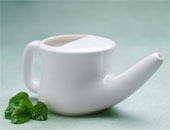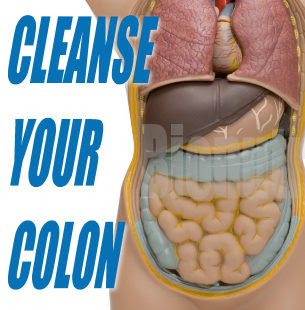July 6th, 2011 by Paul Auerbach, M.D. in Health Tips
No Comments »

 Nasal irrigation is sometimes recommended to thin or remove mucous from the nose. The two most common conditions that produce mucous are upper respiratory infections (e.g., the “common cold”) and allergies. Irrigation may also be beneficial to clear out dust, dirt, and allergens, and to allow the cilia within the nose to function more efficiently. Cilia are organelles that work to move mucous and debris in the nose (among other parts of the body) to a location where they can be expelled more easily. Another benefit of nasal irrigation is that it moisturizes the mucous membranes inside the nose.
Nasal irrigation is sometimes recommended to thin or remove mucous from the nose. The two most common conditions that produce mucous are upper respiratory infections (e.g., the “common cold”) and allergies. Irrigation may also be beneficial to clear out dust, dirt, and allergens, and to allow the cilia within the nose to function more efficiently. Cilia are organelles that work to move mucous and debris in the nose (among other parts of the body) to a location where they can be expelled more easily. Another benefit of nasal irrigation is that it moisturizes the mucous membranes inside the nose.
Methods of Nasal Irrigation
Irrigation can be pulsatile or non-pulsatile (sometimes called “laminar flow”). Each type has its advocates. It is generally felt to be a safe practice so long as Read more »
This post, Everything You Wanted To Know About Nasal Irrigation, was originally published on
Healthine.com by Paul Auerbach, M.D..
July 2nd, 2011 by John Di Saia, M.D. in Health Tips, Quackery Exposed
2 Comments »

I read online a woman telling about how her saline breast implants got mold and she had terrible problems. Does this happen very often?
A few years ago I put up a YouTube video of my experience with silicone gel breast implants. Now every six months to a year somebody posts a comment about how saline implants are just as dangerous. A frequent portion of that response is a statement about a moldy saline implant. My response is and always has been, if saline implants are so often affected by mold, then why have I never seen it?
I have been implanting (and at times removing) breast implants for over 15 years. You would think if something was a dangerous and common phenomenon that I would be seeing it. I haven’t. Not even once.
A saline implant when left on a table outside of your body can develop mold, but this doesn’t seem to happen inside patients. The difference is probably that when implants are properly placed inside a woman’s breasts, her immune system helps protect them from such problems. Read more »
*This blog post was originally published at Truth in Cosmetic Surgery*
May 4th, 2011 by Peggy Polaneczky, M.D. in Health Tips, Research
No Comments »

 Two studies published in this weeks’ British Medical Journal, one from the US and the other from the UK, report that users of drosperinone containing oral contraceptives (Yaz, Yasmin and their generics) have increased relative risks for non-fatal blood clots compared with users of pills containing levonorgestrel.
Two studies published in this weeks’ British Medical Journal, one from the US and the other from the UK, report that users of drosperinone containing oral contraceptives (Yaz, Yasmin and their generics) have increased relative risks for non-fatal blood clots compared with users of pills containing levonorgestrel.
While neither study is perfect, and indeed have some very major limitations, they add to a growing body of evidence that pills containing drosperinone may impart higher risks for blood clots than older pills. Yaz is not alone in this regard – other studies have suggested that pills containing the newer progestins gestodene and desogestrel also impart slightly high clot risks than the so-called first and second generation pills containing the older progestins norethindrone and levonorgestrel.
I won’t go into the studies’ limitations here, but will say that trying to get our hands around comparative data on clot risks between various pills is an extraordinarily difficult process given that the diagnosis of blood clots is not always straightforward (or correct), pill choices are not randomized and fraught with prescribing bias, and confounding risk factors for clotting are numerous and difficult to control for. I wish folks would stop trying to answer these questions on the quick and cheap using claims and pharmacy databases without requiring chart review and strict diagnostic criteria. But that’s the way these studies are being done, and that’s the data I am being forced to contend with in my practice, so let’s talk about it. Read more »
*This blog post was originally published at The Blog That Ate Manhattan*
April 16th, 2011 by Shadowfax in Health Tips, Opinion, Research
No Comments »


There was an interesting study published this week in the journal Radiology:
Rising Use of CT in Child Visits to the Emergency Department in the United States, 1995–2008 (Abstract)
The results are not surprising to anyone who has been working in medicine in the US over the last fifteen years. Basically, in 1995, a kid visiting the ER had a 1.2% likelihood of getting a CT scan, and by 2008, that number was 5.9%.
I had written about this general phenomon not too long ago, in defense of the general increase of CT utilization in the ER, largely on the basis that CT is a better tool: it provides diagnoses in a rapid and timely manner, and excludes many potential life threats, saving lives and mitigating malpractice risk. That was largely relevant to the adult population, though, and kids are not, as they say, just little adults. The increase in scanning children is more dramatic, especially given the generally lower incidence of disease in kids compared to adults and the chonrically ill. Read more »
*This blog post was originally published at Movin' Meat*
February 16th, 2010 by Toni Brayer, M.D. in Better Health Network, Quackery Exposed, Research
No Comments »

 The internet is full of colon cleansing methods that tout the benefits of colon detox. I saw one website that showed long “worms” that live for years in the colon that “need” to be removed with special expensive potions. One of the most common questions for GI doctors is about colon cleansing and if it is beneficial. I don’t know any physicians who believe the colon needs “detoxification” or special cleansing, but until now I didn’t have a scientific way to answer that question from patients.
The internet is full of colon cleansing methods that tout the benefits of colon detox. I saw one website that showed long “worms” that live for years in the colon that “need” to be removed with special expensive potions. One of the most common questions for GI doctors is about colon cleansing and if it is beneficial. I don’t know any physicians who believe the colon needs “detoxification” or special cleansing, but until now I didn’t have a scientific way to answer that question from patients.
A study from the Am J. Gastroenterology now gives us the answer. The study authors looked at all relevant articles published between 1966 and 2008. They blinded the articles and measured outcomes and adverse events. Read more »
*This blog post was originally published at EverythingHealth*
 Nasal irrigation is sometimes recommended to thin or remove mucous from the nose. The two most common conditions that produce mucous are upper respiratory infections (e.g., the “common cold”) and allergies. Irrigation may also be beneficial to clear out dust, dirt, and allergens, and to allow the cilia within the nose to function more efficiently. Cilia are organelles that work to move mucous and debris in the nose (among other parts of the body) to a location where they can be expelled more easily. Another benefit of nasal irrigation is that it moisturizes the mucous membranes inside the nose.
Nasal irrigation is sometimes recommended to thin or remove mucous from the nose. The two most common conditions that produce mucous are upper respiratory infections (e.g., the “common cold”) and allergies. Irrigation may also be beneficial to clear out dust, dirt, and allergens, and to allow the cilia within the nose to function more efficiently. Cilia are organelles that work to move mucous and debris in the nose (among other parts of the body) to a location where they can be expelled more easily. Another benefit of nasal irrigation is that it moisturizes the mucous membranes inside the nose.

















